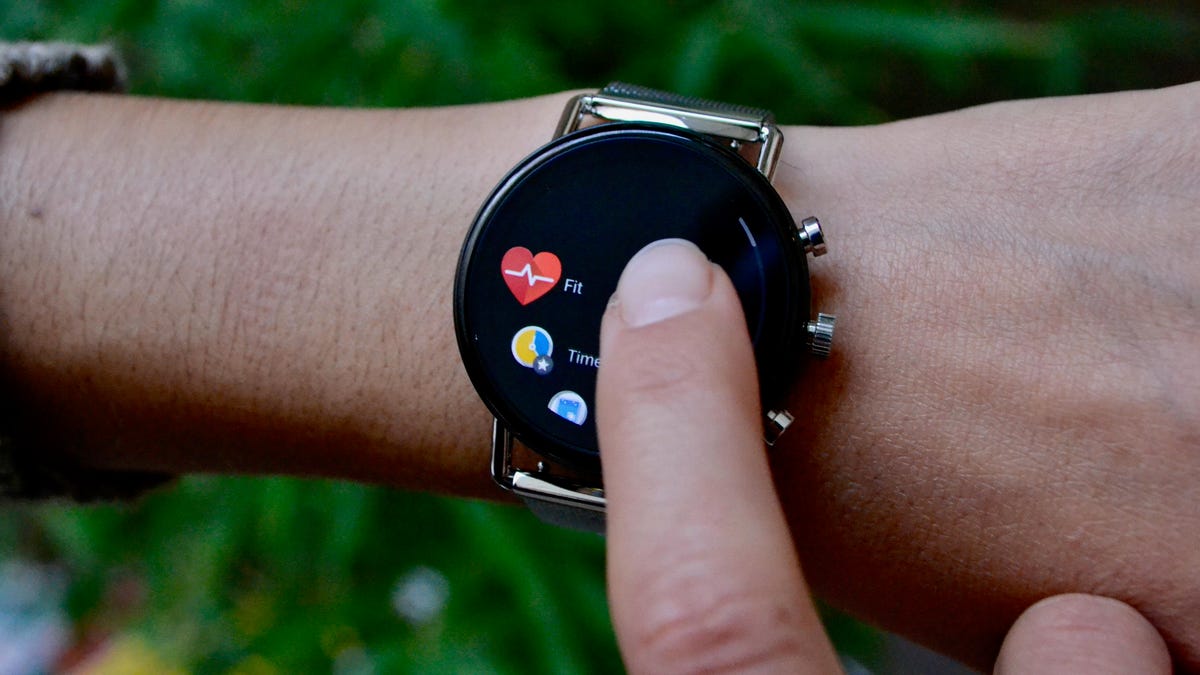Smartwatch makers try to get a jump on Apple with fitness push
Their IFA 2018 unveilings come just two weeks before Apple's big September product revelations.

Skagen this week revealed the new Falster 2, which offers a heart rate tracker and GPS.
Sitting in a corner of the Mobvoi's booth at this week's IFA tech conference in Berlin, Jason Zheng offers a colorful pitch for his company's smartwatches.
"You don't want to be that douche who pulls out your phone," Zheng, Mobvoi's international head of PR, said jokingly. "We think smartwatches can reduce those douche pain points in your social life."
While a performance metric for "douche pain points" (or DPP) may never get popular, Zheng was hitting on an important aspect about the future of smartwatches and how watchmakers could find ways to compete against Apple , the leader in the market.
The new Casio Pro Trek smartwatch.
Since the Apple Watch launched three years ago, smartwatches have gotten plenty of interest. Even so, the devices have had a less-than-stellar start since there hasn't been a clear reason to have them and battery life is often dismal. That's been changing, with smartwatches becoming more useful by building up their health and fitness capabilities. They also offer quick notifications to help you stay connected without having to constantly check your phone, which could be a selling point for people worried abut phone addiction.
At IFA, several major brands revealed new smartwatches with a clear emphasis on health and wellness functions. On that list was Casio , whose refreshed $549 Pro Trek outdoors-focused watch includes a new "extended mode" that lets the color display last longer for days-long hikes. Also, Fossil Group's Skagen and Diesel brands launched new watches that both added GPS and heart rate tracking for fitness and outdoor activities.
The new Diesel On Full Guard.
All three new watches use Google's Wear OS , previously called Android Wear. Google, too, has been focusing more on wellness and fitness, adding activity functions called "Move Minutes" and "Heart Points" to its Google Fit app. Google also created a digital wellbeing feature in its new Android Pie mobile operating system to help curb phone usage. (Apple created similar screen-time features for its phones, too.)
At Casio's IFA press event, Miles Barr, engineering director for Wear OS, said Google has found from user studies that smartwatches have worked better at getting you the information you need, then getting you back to what you were doing.
"I can't remember the last time I looked at my phone and only did one thing with it," he added.
Apple versus everyone else
If it seems like everyone's launching a smartwatch at IFA, a primary reason is that they're all trying to get a jump on Apple.
Apple is expected to update its popular Apple Watch, which starts at $329, during an event on Sept. 12. The company's WatchOS 5 software, unveiled in June at its WWDC developer conference and arriving on the next watch, brings a number of fitness improvements to the device, an instant watch-to-watch walkie-talkie mode, support for podcasts and an ability to play audio from third-party apps on the go.
Apple doesn't reveal sales figures for the device, but market researcher IDC estimates that nearly half of the 43.5 million smartwatches shipped this year will come from Apple. Google's Wear OS trails behind at 12 percent. And Android Wear, which is still used by some watchmakers, should total 18 percent of shipments. By 2022, Android Wear and Wear OS combined are expected to catch up to Apple.
"While Apple will undoubtedly lead in this category, what bears watching is how Google and its partners move forward," IDC analyst Jitesh Ubrani noted in June. He said that Wear OS has been "somewhat of a laggard," and even with its changes, it faces tough competition.
Samsung , Google's biggest Android partner, has shunned Wear OS in favor of Tizen, its own operating system for watches, TVs and other devices. Earlier this month, it introduced its new Galaxy Watch, which starts at $330 and should give Wear OS even more competition.
CNET's Scott Stein noted that the new Samsung watch isn't much different from its predecessors in terms of design. It's a round watch with a dial for navigating the home screen and different apps. But what it adds is the Bixby digital voice assistant, as well as more exercise trackers and stress-management features. Fitness and sleep tracking are tied to Samsung's S-Health app, but the watch also connects to fitness apps from Under Armour, MapMyRun, Speedo and others.
It's still too early to tell whether these fitness and wellness pitches will get more people to buy smartwatches. Sales of the devices are dwarfed by the size of the smartphone market, so building up a bigger following could take time.
Plus, some would argue that a smartwatch works against the idea of digital well-being by offering someone yet another distracting screen to look at and while getting pulled away from a conversation.
Zheng, of Mobvoi, disagrees.
"We don't think you're going to get addicted to your watch anytime soon," he said.
Google Wear OS updates: Hinting at fitness smartwatches to come.
Everything from IFA: All the hottest (and weirdest) tech from Berlin.



